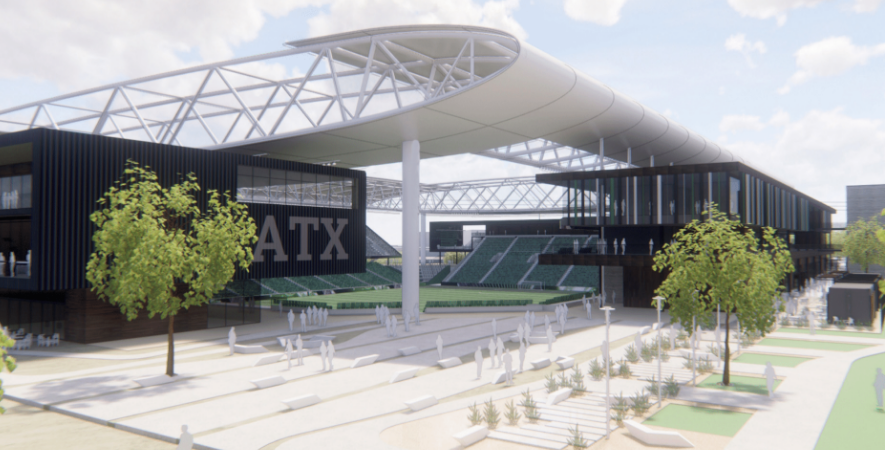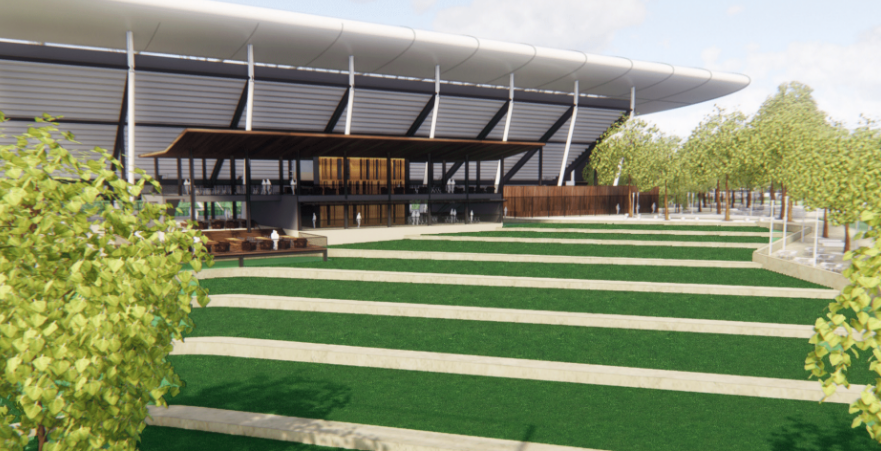It’s finally close to decision time for the future of a professional soccer team here in Austin, which means we have lots of news updates for you!
First, a quick refresher –
In October, the owner of the professional soccer team Columbus Crew announced that he was exploring moving the team from Ohio to Austin, citing the desire for a centrally-located stadium as one of the major drivers motivating his decision. The announcement has been marked by excitement for some (it would be Austin’s first professional sports team) and apprehension by others (who fear Columbus Crew might be seeking public funds or favors from Austin taxpayers).
After some back and forth over various stadium location options (including a few controversial ones at Butler Shores and Roy Guerrero Park) all eyes have turned to McKalla Place, a piece of city-owned land located near the Domain. It’s currently being used as a storage site by several city departments, but essentially is just an open and underutilized lot.
Okay, now that you’re up to speed, let’s run through some updates.
1. The owners of Columbus Crew have released a proposal to build a soccer stadium at McKalla Place.
Key features of their plan include:
- The soccer team owners (Precourt Sports Ventures) will privately-fund the construction of the stadium
- However, the City of Austin will retain ownership of the land. Precourt Sports Ventures will then lease it for $1 a year. (This means that PSV will not pay any property taxes on the land.)
- The City of Austin will be responsible for “all site preparation, remediation and off-site infrastructure,” of the site, which has already raised a lot of eyebrows. But, since the PSV plan was only just recently released, the exact details about what costs the city would have to bare are still a bit murky.
- Of the 24 acres at McKalla Place, nine will be used for the stadium and the remaining 15 will be designed as open and accessible space for the community. Space for live music performances will also be included throughout the site.
- 1,000 parking spaces would be built on site for a stadium with about a 20,000 person capacity. PSV wants to keep parking spaces at a minimum and instead encourage attendees to walk, ride their bike, take shuttles, or utilize public transportation to get to the stadium. (There has also been talk about building a MetroRail Station at the stadium, but where that funding would come from is still unclear.)
- The stadium would open up to the public and host its first event in Spring of 2021
- PSV’s goal is for the stadium project will receive at least a 2 star rating from Austin Energy Green Building
You can read through their entire proposal here.
2. The owners of the Columbus Crew have also released a list of economic and community benefits they believe their stadium will bring to Austin.
These include:
- Over $354 million over the first 25 years “will be invested in jobs, nonprofits, and community benefits,” including $93 million in direct benefits to affordable housing, nonprofit support, and youth programs
- PSV will make a $500,000 upfront payment to Foundation Communities to help fund the new Waters Park Studio affordable housing development near McKalla Place. After that, $125,000 will be donated to Foundation Communities each year, which adds up to $4.8 million in total funding.
- PSV will discuss the possibility for future on-site affordable housing at McKalla Place with Foundation Communities
A third-party economic impact study was also just released. It says that during the construction period, the project will support $54.2 million in economic activity, $49 million in wages, and 934 full-time equivalent jobs within the city of Austin. On a recurring basis, the study says that the franchise and stadium operations will support $25.6 million in economic activity, $22.1 million in wages, and 342 full-time equivalent jobs within the City.
However, many questions have been raised over these economic impact analyses. On the City Council Message Board, Austin City Council Member Alison Alter shared a survey conducted by the University of Chicago Booth School of Business. Alter explained that in the survey, only 2 percent of economists disagreed with the following statement – “Providing state and local subsidies to build stadiums for professional sports teams is likely to cost the relevant taxpayers more than any local economic benefits that are generated.”
3. There are still other options on the table about what to do with McKalla Place (other than turning it into a soccer stadium).
Two developers have recently thrown out proposals for what they’d like to do with the land (which call for a mix of affordable and market-rate housing, office space, and retail). Last week, one of these developers offered to buy the land from the city for $22.5 million or a $2.2 million annual lease.
McKalla Place has also been identified by the city as a possible site for an affordable housing development. A petition has been circulating on change.org to convince City Council to reject the idea of building a soccer stadium on publicly-owned land altogether and instead to utilize public property for affordable housing, which is becoming an increasingly growing need in Austin.
In light of all of these competing interests around the future of McKalla Place, Austin City Council Member Leslie Pool (whose district includes McKalla Place) has called for an open RFP process to decide the future of the property. (For those not well versed in city lingo, RFP means request for proposal. This is the way the city typically hires outside contractors for specific projects or sells city-owned tracts of land. If City Council does decide to allow McKalla Place to go to an RFP process, it would open it up to other options besides a soccer stadium, including mixed use development and affordable housing).
In essence, here are the questions being asked in the middle of this soccer debate right now – How badly does Austin want a professional soccer team? What benefits could a soccer team bring to Austin (both economically and culturally)? What mix of compromises by both the city and Precourt Sports Ventures would result in a good deal for Austin? Or, is it even appropriate (given Austin’s other needs) for a soccer stadium to be built on public land? Should the city be negotiating at all?
So what comes next?
Precourt Sports Ventures has said they need at least a preliminary agreement in place by the end of this month (before City Council goes on their July recess) in order to move the team to Austin in time for the 2019 season (which is their goal). This short timeline means that there is going to be a lot of debate and discussion over the next few weeks. Council Member Pool has already raised concerns that there simply is not enough time to strike a good deal for the city.
On the City Council Message Board she wrote,”…I believe a professional soccer team could be a real community benefit to the city – but that it depends on how and where that gets done. There have been conversations for years about Major League Soccer’s interest in coming to Austin and PSV presents a compelling case for why Austin would be a receptive community.
But I firmly believe we need a deal that invests in our community rather than a deal that wants an investment from our community. To that end, I will work in good faith to consider all proposals regarding the McKalla Place site and — even if we choose to go with another vision for McKalla specifically — will work constructively to support other ways to bring a privately financed soccer stadium to Austin. Ultimately, no matter what we decide as a Council, I want us to make that decision with full information and clear eyes.”



